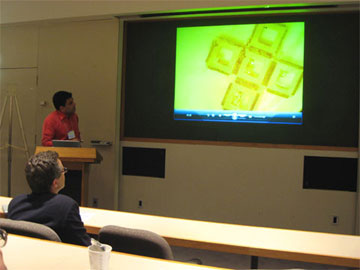Home > Press > Graduate Students, Faculty Network at INBT Inaugural Retreat
 |
| Assistant professor David Gracias (ChemBE) describes self-assembled nanoliter containers.Credit: INBT / JHU |
Abstract:
Johns Hopkins Institute for NanoBioTechnology held its first annual pre-doctoral (graduate) student retreat at the Mount Washington Conference Center on Sunday, October 28, 2007.
Graduate Students, Faculty Network at INBT Inaugural Retreat
Baltimore, MD | Posted on November 12th, 2007The retreat was arranged to engage students involved in both the National Science Foundation sponsored Integrative Graduate Education and Research Traineeship—or NanoBio IGERT—and the Howard Hughes Medical Institute (HHMI) sponsored Interdisciplinary Graduate Training in Nanotechnology for Biology and Medicine—or NBMed Program. Four faculty members affiliated with INBT presented their research during the morning speaker session. Speakers from the School of Medicine included Douglas Robinson, assistant professor of cell biology, and Jonathan Schneck, professor of pathology. Presenters from the Whiting School of Engineering included Hai-Quan Mao, assistant professor of materials science, and David Gracias, assistant professor of chemical & biomolecular engineering. Terrence Dobrowsky, a student in the HHMI program, also presented.
Denis Wirtz, associate director of INBT and professor of chemical and biomolecular engineering, began the retreat by welcoming eight new students into the INBT's graduate training programs. There are 15 students altogether in both programs, and they come from the departments of Materials Science and Engineering, Chemical an Biomolecular Engineering, Mechanical Engineering, Physics, and Biology.
About 45 students and faculty participated in a lively question and answer session in the morning, a chance to network during lunch, and further discussion during the afternoon poster session. INBT wishes to thank education program coordinator Ashanti Edwards for making the institute's inaugural retreat such a huge success.
####
About Institute for NanoBioTechnology
The Institute for NanoBioTechnology at Johns Hopkins University will revolutionize health care by bringing together internationally renowned expertise in medicine, engineering, the sciences, and public health to create new knowledge and groundbreaking technologies.
INBT programs in research, education, outreach, and technology transfer are designed to foster the next wave of nanobiotechnology innovation.
Approximately 150 faculty are affiliated with INBT and are also members of the following Johns Hopkins institutions: Krieger School of Arts and Sciences, Whiting School of Engineering, School of Medicine, Bloomberg School of Public Health, and Applied Physics Laboratory.
For more information, please click here
Contacts:
* Institute for NanoBioTechnology
214 Maryland Hall
3400 North Charles Street
Baltimore, MD 21218
* Email:
* Phone: (410) 516-3423
* Fax: (410) 516-2355
Copyright © Institute for NanoBioTechnology
If you have a comment, please Contact us.Issuers of news releases, not 7th Wave, Inc. or Nanotechnology Now, are solely responsible for the accuracy of the content.
| Related News Press |
Interviews/Book Reviews/Essays/Reports/Podcasts/Journals/White papers/Posters
![]() Simulating magnetization in a Heisenberg quantum spin chain April 5th, 2024
Simulating magnetization in a Heisenberg quantum spin chain April 5th, 2024
![]() Discovery points path to flash-like memory for storing qubits: Rice find could hasten development of nonvolatile quantum memory April 5th, 2024
Discovery points path to flash-like memory for storing qubits: Rice find could hasten development of nonvolatile quantum memory April 5th, 2024
Events/Classes
![]() Researchers demonstrate co-propagation of quantum and classical signals: Study shows that quantum encryption can be implemented in existing fiber networks January 20th, 2023
Researchers demonstrate co-propagation of quantum and classical signals: Study shows that quantum encryption can be implemented in existing fiber networks January 20th, 2023
Nanobiotechnology
![]() New micromaterial releases nanoparticles that selectively destroy cancer cells April 5th, 2024
New micromaterial releases nanoparticles that selectively destroy cancer cells April 5th, 2024
![]() Good as gold - improving infectious disease testing with gold nanoparticles April 5th, 2024
Good as gold - improving infectious disease testing with gold nanoparticles April 5th, 2024
![]() Researchers develop artificial building blocks of life March 8th, 2024
Researchers develop artificial building blocks of life March 8th, 2024
|
|
||
|
|
||
| The latest news from around the world, FREE | ||
|
|
||
|
|
||
| Premium Products | ||
|
|
||
|
Only the news you want to read!
Learn More |
||
|
|
||
|
Full-service, expert consulting
Learn More |
||
|
|
||








